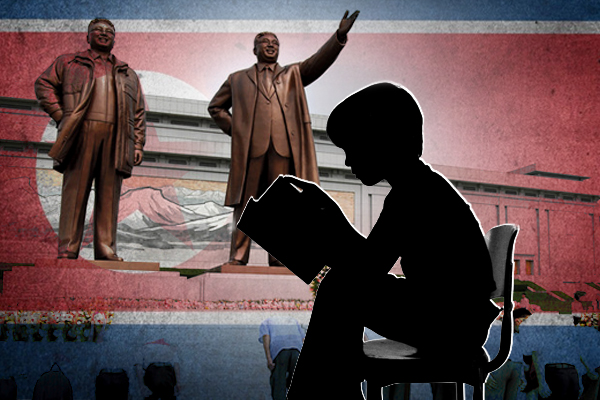The Seoul Metropolitan Office of Education plans to distribute books and teaching materials that glamorize North Korea’s nuclear development and the ruling Kim family, a lawmaker recently revealed. Some of the books legitimize arguments calling for the withdrawal of the U.S. forces in South Korea and speak ill of North Korean defectors living in South Korea.
Chung Kuyng-hee, a lawmaker from the main opposition People Power Party (PPP), acquired the list of 36 books and 22 supplementary teaching materials recommended by the Seoul Metropolitan Office of Education. Chung said on April 29 that the office planned on distributing them to 44 elementary schools, middle schools, and high schools in Seoul. The office will purchase the books and teaching materials that schools requested from the list with a one million won ($902) budget per school. Schools that receive the books and teaching materials were supposed to provide a so-called “Peace and Unification Education” program from May to July.
One of the books on the list is titled “Can We Live Together?” It was written by Kim Jin-hyang, a former presidential secretary under the leftist Roh Moo-hyun administration. “The purpose of the nuclear weapons developed by North Korea cannot be to attack others in the first place,” Kim wrote. “North Korea is actually proceeding with the denuclearization process based on agreements it made with other countries. The fundamental way to solve the North Korean issue is to have the United States give up its hostile policy toward Pyongyang. Ultimately, signing the end of the armistice agreement and peace agreement would solve everything.”
Kim argued that there would not be any military conflict even if U.S. forces leave South Korea. “If they leave, we would be able to use the budget for military cost-sharing in areas that we really need.”
Some books also criticized North Korean defectors settled in South Korea. “Defectors came to South Korea to make a living, and only very few of them came here because they did not like the North Korean regime,” one book read. “They came to the south because they were tempted by people saying the south will give them money to settle down and a place to live. They will eventually become slaves of capitalism.”
A book titled “A Story of Peaceful Unification with Teenagers” blamed North Korean provocations on previous conservative administrations. “As a result of the Lee Myung-bak administration’s hostility toward North Korea and public mention of the possibility of a military attack, military conflicts between the North and South, as well as shooting of a South Korean tourist at Geumgang resort occurred,” the book argued. It even used the term “Cheonan Warship Incident,” instead of the “Sinking of Cheonan Warship.” Some people in South Korea use the term “incident” to obscure North Korea’s role in the sinking.
Another book titled “We are the Unification Generation,” argued that “[North Korea’s] Okryu Children’s Hospital conducted more than 3,000 children’s heart surgeries for free, and it clearly shows the difference with reality in South Korea, where people do not know what to do when one of their family members has a critical health situation.”
“It became possible for North Korean people to eat high-quality meat as much as they want, and they created a new kind of mythological pride,” the book read. It argued that North Koreans glorify freedom and democracy, but that “in a capitalist country, money is (the) individual’s ability and power, and this is why individual’s freedom and the market order are being shaken.” The book even praised the North Korean government for giving out housing for free and said that people do not have to worry about buying or selling their homes. It sounds almost the same as North Korean propaganda.
There were other books such as “Will the Country Collapse if There is No Military?” or “Sorry, it is My First Time Experiencing Peace,” which were written by conscientious objectors who opposed mandatory military service.
“Most of the books and teaching materials on the list can introduce left-leaning historical views and distorted facts about North Korea,” Rep. Chung Kyung-hee said. “I am concerned, because emphasizing fake peace with North Korea could lead to more significant problems with national security in the future.”
The Seoul Metropolitan Office of Education released a statement on April 29 that said the books and teaching materials are currently still under review. It said 21 teachers participated in the book recommendations.
“The purpose is to educate students through various aspects of history, and it was not the aim to force them to learn about certain ideology,” said an official at the Seoul Metropolitan Office of Education. “Participating schools are currently submitting their requests for books and teaching materials, and the finalized list will be distributed after the review process.
Meanwhile, the Board of Audit and Inspection of Korea recently reported Seoul Metropolitan Office of Education Superintendent Cho Hee-yeon to the police over allegations of abuse of power and corrupt teacher hiring practices. According to the board, Cho allowed five teachers who were fired for violating the Public Official Election Act to be re-hired in 2018. The board found that at least one of the five was a member of Cho’s staff during his election campaign in 2018. All of them were members of the Korean Teachers and Education Workers Union, which is considered one of the most influential leftist civic groups.
Cho was elected as the education superintendent of Seoul in 2014 and re-elected in 2018. He was the candidate of the ruling party and his term ends next year.


